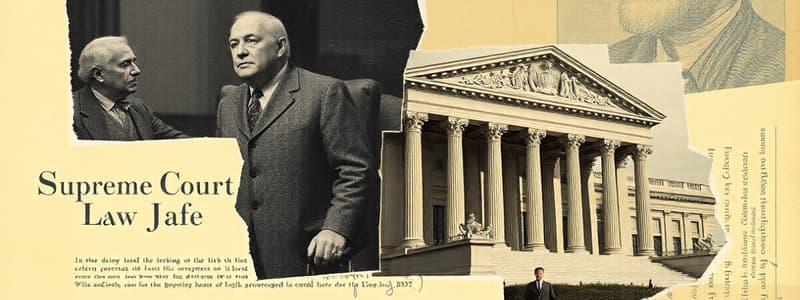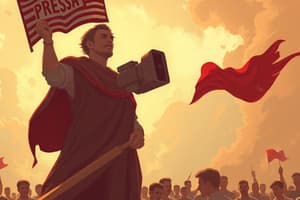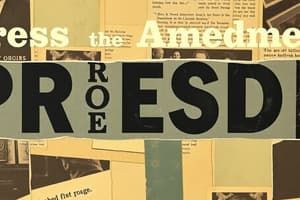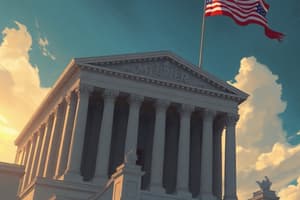Podcast
Questions and Answers
What trend did the Supreme Court's interpretation of the First Amendment undergo in the 20th century?
What trend did the Supreme Court's interpretation of the First Amendment undergo in the 20th century?
- Consistent interpretation without changes
- A narrow reading followed by increased protections (correct)
- Increased restrictions on press freedom
- Complete disregard for press rights
What was the primary content of the Pentagon Papers?
What was the primary content of the Pentagon Papers?
- Military advancements in the Cold War
- A comprehensive history of the Vietnam War (correct)
- Plans for the U.S. military operations in World War II
- Public relations strategies for the Vietnam War
Which action did the Nixon administration take regarding the Pentagon Papers?
Which action did the Nixon administration take regarding the Pentagon Papers?
- Commissioned a new set of reports
- Publicly released all reports to the media
- Endorsed publication for transparency
- Attempted to prevent newspapers from publishing stories about them (correct)
What was the outcome of the New York Times Co. v. United States case?
What was the outcome of the New York Times Co. v. United States case?
Which Justice famously stated that 'Only a free and unrestrained press can effectively expose deception in government'?
Which Justice famously stated that 'Only a free and unrestrained press can effectively expose deception in government'?
How did the legal protection for freedom of the press change by the end of the 20th century?
How did the legal protection for freedom of the press change by the end of the 20th century?
In what context were the Pentagon Papers compiled?
In what context were the Pentagon Papers compiled?
What key change in the Supreme Court's treatment of the press occurred during the 1960s and 1970s?
What key change in the Supreme Court's treatment of the press occurred during the 1960s and 1970s?
Which individual was responsible for directing the compilation of the Pentagon Papers?
Which individual was responsible for directing the compilation of the Pentagon Papers?
What was one significant piece of evidence contained in the Pentagon Papers?
What was one significant piece of evidence contained in the Pentagon Papers?
What was the response of the Nixon administration to the leak of the Pentagon Papers?
What was the response of the Nixon administration to the leak of the Pentagon Papers?
What was the outcome of the New York Times Co. v. United States case regarding the Pentagon Papers?
What was the outcome of the New York Times Co. v. United States case regarding the Pentagon Papers?
How did the First Amendment's protections of the press evolve by the end of the 20th century?
How did the First Amendment's protections of the press evolve by the end of the 20th century?
What fundamental belief did Justice Hugo Black emphasize regarding the role of the press?
What fundamental belief did Justice Hugo Black emphasize regarding the role of the press?
Flashcards are hidden until you start studying
Study Notes
First Amendment Protection of the Press
- The Supreme Court's interpretation of the First Amendment has changed over time.
- The Court initially read the First Amendment narrowly, but it has increased protections throughout the 20th century, particularly in the 1960s and 1970s.
- The Pentagon Papers case exemplifies this shift toward stronger press protections.
- The Pentagon Papers were a series of reports compiled in the late 1960s, documenting the Vietnam War.
- The reports revealed that government officials had misled the public about the war.
- The Nixon administration attempted to prevent newspapers from publishing stories about the Pentagon Papers.
- In New York Times Co. v. United States, the Supreme Court sided with the newspapers, affirming the importance of a free press.
- Justice Hugo Black emphasized the press's crucial role in exposing government deception.
- The legal protection offered by the First Amendment is now stronger than ever.
First Amendment Protection of Press
- The Supreme Court's interpretation of the First Amendment's protection of press freedom has evolved over time.
- The Supreme Court interpreted the First Amendment narrowly until the 1920s.
- The Supreme Court significantly expanded the First Amendment protections during the 20th century, particularly in the 1960s and 1970s.
- The Pentagon Papers case, New York Times Co. v. United States, cemented the Supreme Court's position in favor of robust press protections.
- The Pentagon Papers revealed that the government misled the public about the Vietnam War.
- The Nixon administration tried to prevent newspapers from publishing the Pentagon Papers.
- The Supreme Court ruled in favor of The New York Times and The Washington Post, upholding the right to publish information.
- Justice Hugo Black stated that a free and unrestrained press is essential to expose government deception.
The Pentagon Papers
- The Pentagon Papers were a series of reports documenting the Vietnam War, commissioned by Secretary of Defense Robert McNamara.
- The Pentagon Papers revealed inconsistencies between the government's public statements and its actions in Vietnam.
- When the Pentagon Papers were leaked, the Nixon administration sought to prevent their publication.
- The Supreme Court's ruling in New York Times Co. v. United States established the strong legal protection for press freedom.
Studying That Suits You
Use AI to generate personalized quizzes and flashcards to suit your learning preferences.




